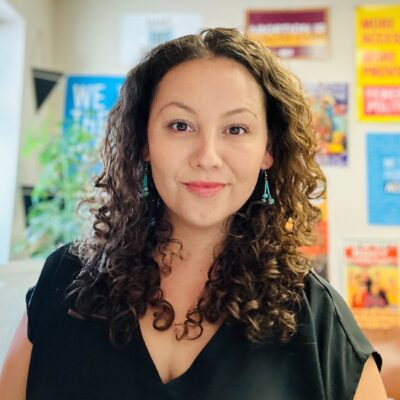Governor Lujan Grisham is moving forward with plans for a special legislative session to address “public safety,” despite calls from 41+ organizations and mental health providers to call it off, and amid a growing chorus of opposition from legislators.
The ACLU-NM’s Nayomi Valdez, Daniel Williams, and Denali Wilson explain why the special session proposals pose a threat to New Mexicans grappling with mental health issues, homelessness, and addiction – as well as critical constitutional protections.
Daniel Williams: The ACLU of New Mexico is always at the Roundhouse to ensure New Mexicans’ rights are protected in the legislative process. But this time, we, and dozens of other organizations and mental health providers wrote a letter urging the governor to scrap her plans. Let’s dig into why we took this approach.
Nayomi Valdez: Sure. There are a couple reasons why we did this. First, the governor switched gears very late in the interim committee process and just a couple of weeks ago introduced new versions of bills related to involuntary commitment, which deepened our concerns about the potential harm to communities as well as threats to people’s rights. Second, it became clear that there was a real lack of consensus from lawmakers, community advocates, and mental health professionals on the specific bills, and that we needed to slow the process down and make sure that the governor was listening to the people who work on these issues every day. And to that point, a special session, slated to conclude in a matter of days, isn’t well suited to passing complicated legislation that will have profound and lasting effects on New Mexicans’ lives. The solutions New Mexicans deserve require more time and thoughtful deliberation.
"We needed to slow the process down and make sure that the governor was listening to the people who work on these issues every day.
Daniel Williams: Yeah, those changes were alarming. And took a lot of people who’d been involved in earlier versions by surprise. Denali, can you talk a little bit about those changes?
Denali Wilson: One of the bills would amend the definitions of “harm to self” and “harm to others” in statutes concerning involuntary commitment. The new definitions are so overly broad that the changes would undoubtedly lead to more people being confined in locked facilities against their will. And we shouldn't be making that process easier or expanding the number of people that could happen to. Another bill is about competency to stand trial, which refers to your ability to understand charges against you and communicate with your attorney. Under this bill, in cases dismissed because someone is found not competent to stand trial, prosecutors would be required to begin the process of involuntary commitment, even when the person is not found to be dangerous. So, collectively, these bills would put more people in locked facilities against their will. That’s not the direction we should go in.
Daniel Williams: Forced treatment is clearly not the answer to New Mexico’s mental health challenges. What we really need is a centralized infrastructure for ongoing, voluntary care throughout New Mexico that, once established, would help keep people who are experiencing addiction or a mental illness from ever getting involved in the criminal legal system to begin with.
"Forced treatment is clearly not the answer to New Mexico’s mental health challenges."
Denali Wilson: Yes exactly, and for people with criminal legal system involvement, the goal would be to get them out as quickly as possible. There are a lot of people who want care but can’t get it, because of an enormous dearth of providers and a lack of community facilities that can treat people with serious mental health challenges and substance abuse issues. These proposals just transfer people from one broken system–the criminal legal system–into another–the system of coercive treatment. These approaches are likely to cause trauma and breed distrust. They won’t make people healthier or our communities safer.
Daniel Williams: I think some people have been surprised that a governor, who has been such a vocal advocate for the right to make your own reproductive health care choices, is advocating for bills that would strip people of the right to make decisions about their mental health.
Nayomi Valdez: It is – and it’s really disappointing. Just a few months ago, these proposals looked very different. They were focused on diversion – or helping people with a mental illness get connected to community services and out of the criminal legal system faster. That’s not the case anymore.
Daniel Williams: The governor’s anti-panhandling bill, which she is referring to as protecting pedestrian safety, is less uprising – as she’s wanted to pass this for a while. Earlier this year at her state of the state address, she openly called for an anti-panhandling bill.
Denali Wilson: She did, and now she’s dressing it up in public safety clothes. But we know it’s about pushing unhoused people out of sight and that it won’t actually advance public safety. If you look at the data, panhandling isn’t the cause of pedestrian deaths in New Mexico. Most importantly, bills like these just criminalize unhoused people and make it more and more difficult for them to get out of homelessness. Because if you’re on the streets asking for money to buy a meal, you don’t have money to pay fines. And if you don’t have money to pay fines, you might wind up in jail. And if you end up in jail and later with a criminal record, it’s harder to attain housing and employment.
"Bills like these just criminalize unhoused people and make it more and more difficult for them to get out of homelessness."
Housing solves homelessness. The governor should be focusing more on addressing the lack of affordable housing and services for people in need. This bill, which is likely to be challenged as unconstitutional in court, is cruel, inhumane, and counterproductive.
Daniel Williams: I think people are eager to know if these are not the solutions our state needs, what’s a better approach?
Nayomi Valdez: Lawmakers have introduced and advocated for legislation in prior sessions that we would support, and that we believe would actually help solve some of the underlying issues New Mexico is facing – without threatening their constitutional rights. Bills that would ensure landlords can’t discriminate against people whose rent is subsidized by the government, that would implement a Medicaid state plan amendment to create a system of certified community behavioral health clinics around the state, that would fund alternative first response teams made up of experts, like social workers, who are trained in crisis response would all make an enormous impact. This isn’t a comprehensive list by any means, but these are all examples of bills that aren’t based on punishment and force. They are truly trying to tackle the root causes of the issues our state is grappling with.
Daniel Williams: I hope we see more proposals like these, and we can finally move away from punishment and criminalization, which we know doesn’t work. We all deserve to be safe, and we need to remind lawmakers that the safest communities usually have the most resources. Let’s keep building those up and strengthening our communities.



